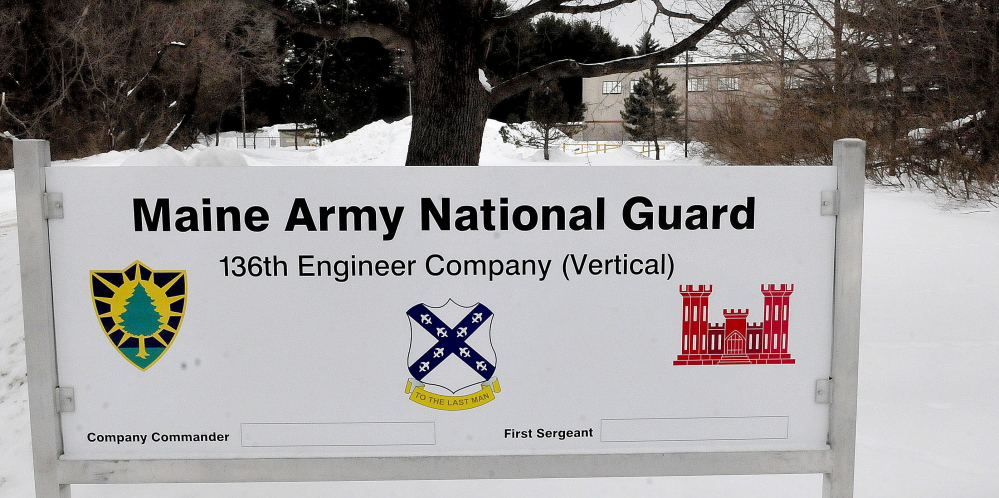The National Guard Bureau has canceled a deployment to Kuwait scheduled for spring 2016 by the 136th Vertical Engineer Company, a Maine Army National Guard unit based in Skowhegan.
The bureau’s move is an indication it has begun the process of swapping Maine engineer units for out-of-state infantry units, a controversial initiative that led Gov. Paul LePage to fire Brig. Gen. James Campbell as adjutant general of the Maine National Guard on Tuesday morning.
Capt. Norman Stickney, public affairs officer for the Maine National Guard, said the National Guard Bureau decided to cancel the deployment to Kuwait because that 136th was among the units that were listed in a recently published Army plan as being transitioned to infantry. That was at Campbell’s request.
“These things take time, but the Army plan was starting that process toward transition,” Stickney said.
Brig. Gen. Gerard Bolduc said he was notified of the change on Wednesday, the day after he was appointed by LePage to succeed Campbell. Members of the Skowhegan company learned of the announcement last week, but Bolduc released news of the cancellation to the public on Friday.
When asked Friday if the decision to transition engineers to infantry would indeed be undone, Bolduc said the Guard is “actively working that” out between the governor’s office and the National Guard Bureau in Washington.
Bolduc and LePage are scheduled to meet next week to discuss how to halt the engineer-to-infantry transition, but Bolduc said all indications so far have been that it’s still possible to do so.
The 136th Engineer Company, which has about 160 members, is one of six companies in the Maine Army National Guard’s 133rd Engineer Battalion, which was at the center of the proposal that led to Campbell’s firing.
Documents obtained by the Portland Press Herald in response to a Freedom of Information Act request show that Campbell and his senior staff initiated a plan to swap the engineer battalion for infantry units from out of state. The governor said those documents revealed to him that Campbell was not forthright about his plans. More specifically, the governor said Campbell insisted the shift was being forced on Maine because of potential budget cuts at the federal level, which was not the case.
The documents also showed that Maine, as a border state, was not at risk of losing engineers, even if federal-level cuts were approved.
Campbell, in an interview Thursday, said he was always upfront with the governor and was shocked by his firing.
Although Campbell’s initial request to the Army in December 2013 was to swap the entire 133rd Battalion for infantry units, that plan changed over time – in part because the initial proposal was leaked – into a plan to transition two of the battalion’s six companies to infantry. The 136th was one of the those companies; the other has not been publicly identified.
In addition to the 136th the five other companies of the 133rd Engineer Battalion are: the Portland-based forward company, the Headquarters support company, the 185th Engineering Support Company of Caribou, the 262nd Engineering Company based in Belfast and Westbrook, and the 251st Engineering Company of Norway.
Stickney said the decision to cancel the deployment was made before Campbell was fired and before LePage vowed to keep the 133rd Engineer Battalion in Maine and stop the transition to infantry.
If LePage prevails and the 136th company remains in Maine as an engineer unit, Stickney said the deployment would still be canceled. The National Guard Bureau would presumably find another unit that specializes in carpentry, masonry, electrical and plumbing work to deploy to Kuwait to provide installation upgrades supporting the draw-down of U.S. forces in Afghanistan.
National Guard Bureau officials have said that no final decisions have been made regarding force structure changes in any states.
Bolduc said Guard staff “will ensure that we support our soldiers and their families throughout the deployment cancellation process.”
The Maine National Guard is made up of roughly 2,100 members who are split between the Army National Guard and Air National Guard. The soldiers are part-time state employees overseen by an adjutant general and the governor, acting as commander-in-chief. In peacetime, the various units of the guard complete regular training and also can be called upon to assist in national disasters, such as hurricanes, or mobilized as a militia, which is rare.
Guard units in Maine and elsewhere fall under federal authority if and when they are called to active duty.
When units are swapped from one state to another, a not uncommon occurrence in the National Guard, personnel don’t necessarily move. Some officials may relocate, but the swaps are more about equipment and name than about personnel. However, if an engineer unit from Maine was sent to another state in exchange for an infantry unit, those engineers would have to be retrained as infantrymen or find another placement.
Bolduc, who was speaking publicly for the first time as head of the Maine National Guard, acknowledged that this week has been a whirlwind.
“Despite all that’s happened in the past, my focus as adjutant general is the future,” he said.
Kennebec Journal Writer Michael Shepherd contributed to this story.
Send questions/comments to the editors.


